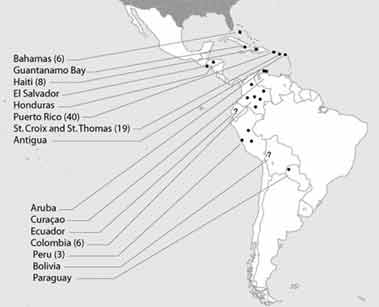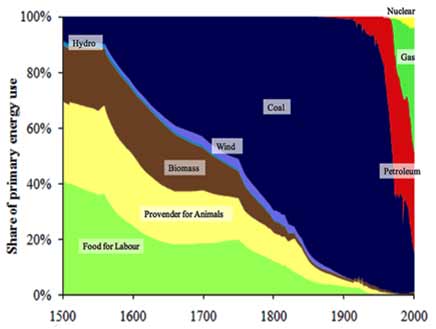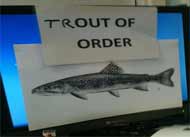Refusing the Future
News and Site Updates Archive 2010/08/15To me, it seems a dreadful indignity to have a soul controlled by geography. — George Santayana About this thing called "patriotism": Japanese pilots who bombed Pearl Harbor were patriotic. Germans supporting Hitler and his conquests were patriotically fighting for the Fatherland. All Latin American military dictators who overthrew democratically-elected governments and routinely tortured people were patriotic — saving their beloved country from "communism". General Augusto Pinochet of Chile, mass murderer and torturer: "I would like to be remembered as a man who served his country." P W Botha, former president of apartheid South Africa: "I am not going to repent or ask for favours. What I did, I did for my country." Pol Pot, mass murderer of Cambodia: "I want you to know that everything I did, I did for my country." Tony Blair, former British prime minister, defending his role in the murder of hundreds of thousands of Iraqis: "I did what I thought was right for our country." If the US military were abolished, total savings would be more than a trillion dollars a year.
The disastrous invasion of Cuba plotted out by Richard Nixon in his final days as vice
president and carried out in the opening months of John F Kennedy’s presidency is known as the Bay of Pigs. CIA analysts determined that invasion failed because it involved poorly-trained irregular
troops acting without the support of the American aircraft carriers stationed nearby. Now Venezuelan President Hugo Chavez, a socialist elected by his own people despite the best efforts of today’s CIA,
says his country faces an imminent invasion, this time with the full backing of the American military. Since the US has already invaded 2 countries in the last decade
in an effort to control the world’s oil resources, the attack on an oil-wealthy nation
in Latin America — a region where the US has always claimed suzerainty — can’t be ruled out, especially given the creation of US military bases in Colombia near the Venezuelan border. And if
Venezuela falls, there are other nearby socialist Latin nation which command critical resources like Bolivia, with the world’s largest proven reserves
of lithium, a mineral critical for today’s high tech batteries. The US has announced the presence of the same element in another recently invaded nation - Afghanistan.  Other Things Some Presidents May Wish They'd Never Done: click once on the photo at left to find out what.  According to a recent survey by Microsoft, 75% of US recruiters and human-resource professionals report that their companies require them to do online research about candidates. Many use a range of sites when scrutinising applicants — including search engines, social-networking sites, photo- and video-sharing sites, personal websites and blogs, Twitter and online-gaming sites. 70% of US recruiters report that they have rejected candidates because of information found online, like drunken photos and discussion-board conversations and membership in controversial groups. The web allows for unprecedented voyeurism, exhibitionism and inadvertent indiscretion, but we are only beginning to understand the costs of an age in which so much of what we say, and of what others say about us, goes into our permanent — and public — digital files. The fact that the internet never seems to forget is threatening, at an almost existential level, our ability to control our identities, to preserve the option of reinventing ourselves and starting anew, and to overcome our chequered pasts. As all of us stumble over the challenges of living in a world without forgetting, we need to learn new forms of empathy, new ways of defining ourselves without reference to what others say about us and new ways of forgiving one another for the digital trails that will follow us always. A few posts about energy follow. I've lived in a couple of places where power was primarily supplied by generator + deep-cycle batteries (boat, motor home). I was in a hurricane once that knocked out power to our house (including our well pump) for 2 weeks. You come to look at power differently once you're immersed in those types of situations. I've lived where power bills skyrocketed in the summer to power air conditioners and where they skyrocketed in the winter to power heaters. I've lived in some extremely poorly-insulated places. Currently, we live and work in a house that was uninsulated when we moved into it but we've gradually corrected its deficiencies. I have seen first-hand what an incredible difference in energy expense and comfort proper insulation can make. There are no answers which are easy, cheap, and also universally applicable. A lot of construction decisions in many parts of the world were made based on assumptions about easy access to firewood, air-conditioning, or ample water. It will take time to overcome obstacles.  There are 87 residents on the small Isle of Eigg in the Inner Hebrides. They recently built an award-winning £1.6 million triple solar, wind and hydro electricity-generating system that was to generate more than 95% of their energy needs from renewable sources. It allows each household access to a maximum of 5 kilowatts of energy at a time (enough to power a washing machine, a small heater, or a kettle, but not all at once). Six miles of buried cable link the island's 45 households, community centre, licensed tearoom, gift shop, restaurant, primary school and two churches, providing a high-voltage network. Or it should do, but not this month. For the past few weeks, the 3- by 5-mile Scottish island has been basking under what constitutes a heatwave in their part of the world. Temperatures have topped 70º F (rather than the usual 59º); there's been no decent rainfall since May (half the annual norm for this time of year); water levels in the 3 main rivers have plummeted and cut off the island's hydroelectricity supply. On top of all that, the winds usually blasting across the island have dwindled to pathetic breezes, leaving the wind turbines useless and locals on bread and cold tea for breakfast. See - they had overlooked one possibility — a spell of lovely weather. In other words, the Eigg experiment has demonstrated that relying solely on the forces of nature for power can be risky.  Air conditioning guzzles power. Energy required to cool US homes and businesses doubled the past 2 decades, burning fossil fuel, emitting greenhouse gas, raising global temperatures (creating need for more air-conditioning). Obvious public-health benefits during severe heat waves don't justify lavish daily use months on end. 50 years ago, America thrived with little use. Though needed in hospitals, archives and cooling centres for those vulnerable to heat, a world without air conditioning would be warmer, more flexible, more relaxed. Summertime would slow down. High temperatures prompt siestas. Code-orange days mean offices are closed. Shorter summer business hours and month-long closings — common in pre-air-conditioned America — return. Business suits are out. With the right to open a window, office employees won't need sweaters or space heaters to work in summer. Ceiling, window, and desk fans — and paperweights — return. Homeowners pry open double-hung windows (painted shut decades ago). Renovations and new construction alike have high ceilings, better cross-ventilation, whole-house fans, screened porches, basements and white "cool roofs" to reflect solar rays. Home utility bills plummet; families unplug as many heat-generating appliances as possible. Neighbourhoods are crisscrossed with clotheslines; outdoor grills are used when possible and dinner eaten outside. People spend time outdoors in late afternoon and evening (which cools off more quickly); neighbourhoods see spontaneous summertime socialising. "Green roofs" of grass, ivy or food crops sprout in cities, insulating interiors from pounding sun (and water from leaves evaporates, cooling). More trees appear. Just don't expect the same level of comfort! — especially in Houston, Atlanta or Charlotte. And you should've planted those shade trees years ago. Do it now. Climate change will significantly impact the sustainability
of water supplies in the coming decades. More than 1,100 US counties — 1/3 of all those in the lower 48 — will face higher risks of water shortages by mid-century as the result
of global warming. More than 400 of these counties will face extremely high risks. But it isn't just global warming causing water shortages — it's overuse of all kinds: grassy lawns and
parks needing to be watered, swimming pools, depleted aquifers, irrigation, huge cities. Note from the graph on the right that
wind was the source of a larger percentage of primary energy generation in 1700 than it is
today. That could change. 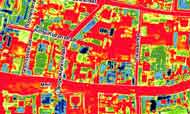
Encouraging thermal insulation of buildings is important in reducing energy costs and minimising carbon emissions. A significant amount of heat escapes unnecessarily via the roofs of most buildings (typically at least 30%). Many governments attempt to tackle this problem by supporting the insulation of roofs through rebates, tax credits and other financial incentives. But how can citizens determine whether such costly renovations are worthwhile for their own houses? The online Belgian project Zoom into Your Roof has tried to help answer this question through visualisation. During the winter of 2009, a small airplane with an infrared scanner made a wide sweeping thermal scan of a large part of Belgium, resulting in the largest thermographic map currently available online. Inhabitants living within this area are able to select their home address and answer a few questions (such as the angle of the roof) in order to determine for themselves how their own roofs actually perform. If you live in an area where it snows, paying attention to the pattern of snow melt on your roof (comparing the speed of melting to other buildings in your area) can also reveal a lot at no cost to you (except maybe for a muffler and mittens). 
How about a pedal-powered washing machine? Unless you're specifically doing it to lose weight, it's possible you'll increase your food bill by more than you reduce your energy bill. But it feels virtuous - and maybe you'll lose a few kilos (or start wearing dirtier clothes). I do have one confession at this point. The website entitled How Much Energy Does Your Site Use? has revealed that the energy required to load this page would power a 100-watt light bulb for 22.825 seconds. You may decide that visiting here just isn't worth it. And really, I wouldn't blame you. In a recent TED talk, Jay S Walker said the transfer of 1 megabyte of data uses energy equivalent to 1 charcoal briquette. 
Recompute is a sustainably-designed computer. The case is made of corrugated cardboard instead of multiple materials. The manufacturing process is non-toxic and only 3 major electronic components are included: a motherboard with processor and memory, a power supply, and a hard drive. Users can utilise keyboards, mice and other hardware from old computers by connecting them to the 8 available USB ports. Finally, Recompute is made to be disassembled without tools so that the parts can be recycled appropriately and easily. Recompute aims to be a fully sustainable computer from manufacturing to recycling at the end of its life. 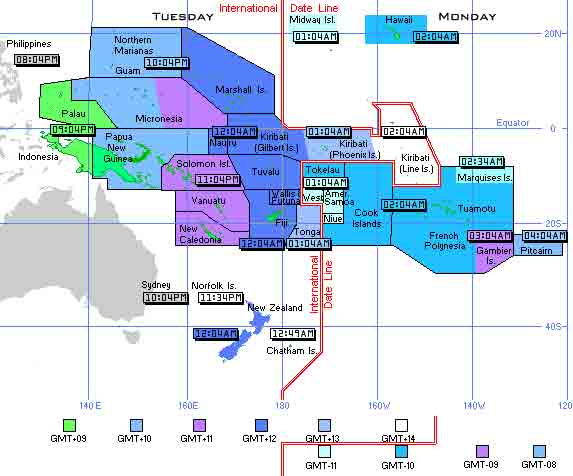
World Time Zone International Dateline Map Greenwich Mean Time is a straight arrow by comparison. And note how odd minutes can be on some of those South Pacific islands.  Kudzu, an invasive vine spreading across the south eastern US and northward into Pennsylvania and New York, is a major contributor to large-scale increases of air pollution. A leafy vine native to Japan and south eastern China, kudzu produces the chemicals isoprene and nitric oxide, which, when combined with nitrogen in the air, form surface ozone - a pollutant that causes significant health problems for humans and hinders the growth of crops. Kudzu-derived ozone completely overcomes the ozone reductions realised from automobile pollution-control legislation. Once considered merely a nuisance, and primarily of concern to ecologists and farmers, it is now proving to be a potentially serious health threat. Ozone acts as an irritant to the eyes, nose and throat and can damage the lungs, sometimes causing or worsening asthma. It is a mutagen and can cause lung cancer. Introduced to the US in the late 19th century, kudzu, with its unique nitrogen-fixing physiology, allows a rapid, nearly uninhibited rate of growth, 3 times the rate of other vegetation. The vine was extensively cultivated in the 1920s and 1930s as a control for soil erosion and rapidly became known as "the vine that ate the South." Controlling and eradicating it includes grazing it with livestock, burning it, mowing it, poisoning it with herbicides, and voodoo. 
Lion's Mane jellyfish (Cyanea capillata) can grow to almost 8 feet in diameter. The largest recorded specimen, found washed up on the shore of Massachusetts Bay in 1870, had a bell with a diameter of 2.3 metres (7 feet 6 inches) and tentacles 36.5 metres (120 feet) long. Those found in lower latitudes are much smaller than their far northern counterparts with bells about 50 centimetres (20 inches) in diameter. The larger specimens are a vivid crimson to dark purple while smaller specimens grade to a lighter orange or tan. Their toxic stings can cause muscle paralysis, leading to suffocation and heart attack. Scores of them were spotted off the coast of Cornwall in the summer of 2010 (they are normally found much further north in colder water). Their tentacles are covered in stinging cells which can cause blisters and severe muscular cramp, affecting the respiratory system and heart function. The sting itself is not fatal. The lifespan of a Lion's Mane jellyfish is about 1 year. Like other jellyfish, they are capable of both sexual reproduction in the medusa stage and asexual reproduction in the polyp stage. They have 4 different stages in their year-long life span: a larval stage, a polyp stage, an ephyrae (juvenile) stage and the medusa stage. 
Short, interesting, optical illusion. 

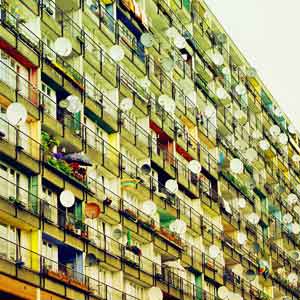 Matthias Heiderich is a Berlin-based photographer. These works are from his series entitled Color Berlin. 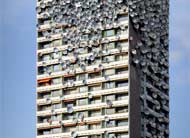
The building with the most satellite dishes ever. This is photography + cgi created in 2007 by Till Nowak who is the creator of the excellent short, Delivery. 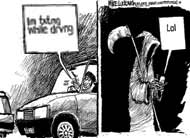 Mining causes of death in 1900 shows that only around 10% of premature deaths were the result of personal decisions compared to today, when that figure has reached 44.5%. This isn't because we’ve become a nation of binge-drinking, murderous smokers — it’s largely through causes of death such as tuberculosis and pneumonia (common in the early 20th century) now being rare while temptations and our ability to make erroneous decisions (think driving while texting) have increased dramatically. Instead of relying on external factors to keep us alive and healthy for longer, we can (and must) learn to rely on our personal decision-making skills in order to reduce the number of dumb and costly mistakes we make. How can we help people become better decision-makers — or at least better at choices where health is concerned? If nearly half of premature deaths can be avoided, it's beneficial to expend effort disseminating knowledge gained in social science about the primary ways people fail to choose wisely. 
Hearing loss caused by loud noise is one of the leading occupational hazards in industrialised countries, especially for those working in the military or construction industries. Young people are, of course, at risk of noise-induced hearing loss from amplified music. Hazardous levels of noise can cause the build up of free radicals, which can overwhelm the defensive systems of sensory hair cells in the inner ear, resulting in cell damage and permanent hearing loss. At present, sufferers can only resort to wearing hearing aids or having cochlear implants. But now researchers from the University of Auckland, New Zealand, have found injecting a chemical agent called "ADAC" into the inner ear can repair damage caused by noise stress. A 5-day treatment of daily through-the-skin injections, starting 6 hours after noise exposure, is most effective. Single treatments are less effective but do result in some hearing recovery. (Sounds similar to a "morning after" pill.) 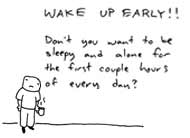
Evolution has produced a range of humans capable of being alert to danger at every hour of the day. Our experience confirms these findings. We all know people who love to be at work bright and early, with a cup of coffee to hand and decisions to make; others stumble through the day until reaching a state of relaxed clarity around dusk, when their minds are purring. The problem is that those with the genetic gift of early rising early tend to be more highly rewarded. Morning-ness is perceived as a sign of activity and zest, whereas evening-ness implies laziness and loafing. Yet research continues to mount that argues that evening people have qualities which should be nurtured. They tend to be more creative, intelligent, humorous and extroverted. They are the balance to morning people, who are said to be more optimistic, proactive and conscientious. Can one change one's chronotype from evening to morning? Somewhat, but it can be quite difficult. 
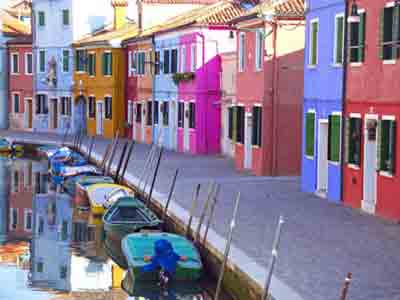 Let's Hear It for Colour Tour de France by Stefan Zimmermann / Burano, Venice, Italy (known for colourful houses) / Mexico Chiapas San Juan Chamula 
Many people learn a foreign language when young, but sometimes exposure is brief and they never hear, or practice, it after that. A subjective impression is often that the neglected language completely fades away from memory. But does "use it or lose it" apply? Although it may seem that there is absolutely no memory of the neglected language, new research suggests this "forgotten" language may be more deeply engraved in the mind than is realised. Even though research volunteers showed no memory of their second language in a vocabulary test, they were able to quickly relearn and correctly identify phonemes spoken in the neglected language. Exposing young children to foreign languages, even if they don't continue to speak them, can have a lasting impact — even if the language is forgotten (or feels that way) after a long period of disuse. Leftover traces of that early exposure can manifest themselves as an improved ability to relearn it. 
The average work week in the US has declined to 34.1 hours while the average television viewing time has increased to 151 hours per month, or 5.03 hours per day. In a 30-day month, that averages 35.23 hours per week — so Americans now spend more time watching tv than working. From a Sydney Morning Herald article dated 22 September 1956: Television will bring about considerable changes in the Australian economy and national way of life. Traders estimate that between 3,500 and 4,000 tv sets have already been installed in New South Wales homes; and demand is rising steeply. One manufacturer alone (there are 28 of them in Australia) says that demand for his sets is now 9 times his rate of supply. Television, then, will alter family budgets; and its screen, alive with images for perhaps 6½ hours each afternoon and evening, will alter family habits. 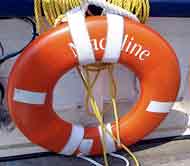
The kind of drowning you see on tv — think thrashy, screamy — doesn't have much in common with what real drowning looks like. That's because of something called the Instinctive Drowning Response, a pattern of behaviour that appears to be hard-wired into humans and pops up whenever somebody feels like they're suffocating in water. From beginning to end of the Instinctive Drowning Response, people's bodies remain upright in the water, with no evidence of a supporting kick. Unless rescued by a trained lifeguard, these drowning people can only struggle on the surface of the water from 20 to 60 seconds before submersion occurs. In real life, a drowning person will be a lot more still and silent than you expect. This is why lifeguarding methods use a "scanning" procedure to cover the guards' zones completely multiple times per minute, and why well-run pools cycle their guards regularly (every 15 — 30 minutes). Paying that much attention to your zone is tiring, and inattention for even half a minute can kill. 
Ladies, are you independent, stubborn, or mildly aggressive in your social interactions? Less interested in having sex with men than your neighbourhood nymphomaniac? Possibly even lesbian or bisexual? Worst of all, are you pursuing a career in a masculine profession, possibly deferring pregnancy and child-rearing to a later date, or even indefinitely? Your diseased state may be due to a congenital abnormality — prenatal exposure to excess androgens. You've been mildly masculinised. Low levels of excess androgens may contribute to such horrors as female homosexuality, a childhood spent playing with trucks, and the ambition to pursue careers in physics, medicine, or computer science (where — face it — you don't really belong). Though you may be condemned to a life of misery trying to compete with men by your aberrant brain, your daughter doesn't have to be (assuming you have one). A drug — dexamethasone (an anti-inflammatory and immunosuppressant) — given prenatally might make her a girly girl, joyously heterosexual, happy to have sex with men, a perfect fit to traditional gender roles, and enthusiastic about having babies (unlike you, who are only doing this out of a sense of duty and diminished self-esteem). Surprisingly, the drug's use has been endorsed by the American Academy of Paediatrics. Why?! Lesbianism, traditionally masculine career choices, and disinterest in having children are not diseases (despite what religious fundamentalists may think). Look for intrauterine testosterone treatments for women carrying boy children, just to make sure they grow up to like football (American, not that pansy soccer stuff) and follow macho careers! Designer children are on the horizon! If homosexuality could be prevented in the womb, should it be? I'd have to say, since it occurs across such a wide spectrum of species, I'd vote "not until you know for sure what you're doing" (which may be never). Bear in mind that the same chemical that prevents homosexuality increases visual acuity when injected into the eye. It makes race horses run faster longer and cures ear infections in dogs. What else might it be doing? 
At the top of one of the Friulian Dolomites in Italy by some photographer identified only as Samuel. In the large image you can see people on top and several on their way up. 
Young Girl in Profile in Renaissance Dress, also called Profile of a Young Fiancée (Italian: La Bella Principessa), is a portrait whose attribution to Leonardo da Vinci is a matter of contention. For all their seeming kinship, a restorer is the antithesis of a painter: he is a conserver, not a creator. Like a mimic, he assumes another person’s style, at the expense of his own identity. He must resist any urge to improve, to experiment, to show off; otherwise, he becomes a forger. Yet, unlike a great actor, he receives no glory for his feats of mimicry. If he has succeeded, he has burnished another artist’s reputation, and vanished without the world ever knowing who he is, or what he has accomplished. The art historian Max J Friedländer called the business of the restorer "the most thankless one imaginable." And what about determining provenance? That can be worse. Even fingerprints may not help. In the 1940's, a safe burglar named Nedelkoff set himself up as a fortune-teller in Eastern Europe, and asked clients to press their hands into a soft clay tablet. Later, he poured liquid rubber into the clay impressions, creating soft casts of their fingertips. During his robberies, Nedelkoff pressed his former clients’ fingerprints onto safes. Eventually, his scheme was unravelled by police. This lengthy but fascinating article is about art and swindles and belief and conflicts of interest and the temptations of easy money. 
Star Sower, Kaunas, Lithuania In the daytime the monument doesn’t make sense but when night comes roll over image to see what happens. 
There's a Problem but Someone Is Fixing It I searched a lot but I couldn't find the page you were looking for. Sorry! 404 Error not found 
You've probably seen this all over the tv (since I don't own one, I wouldn't know that) and/or multiple places on the web — but if not, it's worth watching the most amazing catch in baseball ever. Also, if you like Jon Stewart, I would recommend watching (again if you haven't seen it) an excerpt from his 15 June show called Respect My Authoritah ("Barack Obama thinks he can be trusted with the power, but he's being stalked by a strange and twisted creature who wants to take the precious away"). I watched it twice. Hanging Out at the Cosmo 
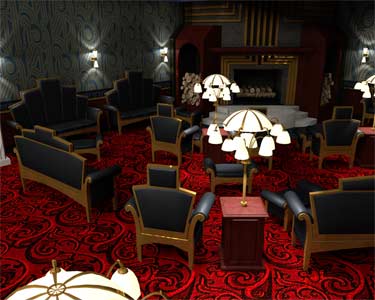
The upstairs Cosmo Theatre bar is called Bojangles. The downstairs lounge is the Green Room where sometimes a pianist plays classical and jazz.
A bicycle can't stand alone; it is two tired.
The US government has a technology, called a printing press, that allows it to produce as many US dollars as it wishes at essentially no cost. — Ben Bernanke
For other updates click "Home" (for the latest) or "Next" (for older) below |
 Animals
Animals Animation
Animation Art of Playing Cards
Art of Playing Cards Drugs
Drugs Education
Education Environment
Environment Flying
Flying History
History Humour
Humour Immigration
Immigration Info/Tech
Info/Tech Intellectual/Entertaining
Intellectual/Entertaining Lifestyles
Lifestyles Men
Men Money/Politics/Law
Money/Politics/Law New Jersey
New Jersey Odds and Oddities
Odds and Oddities Older & Under
Older & Under Photography
Photography Prisons
Prisons Relationships
Relationships Science
Science Social/Cultural
Social/Cultural Terrorism
Terrorism Wellington
Wellington Working
Working Zero Return Investment
Zero Return Investment
